Overview of the department
Note
This information was current as of November 2015.
Environment Canada’s People
Environment Canada (EC) employs approximately 6,200 public servants (can vary throughout the year) distributed across the country as follows:
| Region | Portion of workforce |
|---|---|
National Capital |
41% |
Ontario |
19% |
Quebec |
13% |
Prairie & Northern |
12% |
Pacific & Yukon |
8% |
Atlantic |
7% |
What we do at Environment Canada
Our employees deliver for Canadians:
- Weather forecasts, including conducting research and providing information about the past, present and future conditions of the atmosphere, climate, water, air quality, ice and related environment. For example, every year more than 1,500,000 public forecasts, 200,000 marine and sea state forecasts, 500,000 aviation forecasts, 10,000 severe weather warnings, and 9,000 ice condition products are provided.
- Essential services to safeguard environmental quality and human health and security by conducting research to better understand wildlife, biodiversity, water, air, soil, climate, environmental prediction and environmental technologies—as well as enforcing all legislation and regulations respecting pollution and the protection of wildlife and habitat administered by the department. EC employees monitor Canada’s ecosystems to understand what is changing, and to evaluate emerging threats.
- Implementation of legislation, regulations and other policies and programs that protect the health of Canadians and their environment, while maintaining a vigorous economy.
- Support to Canada's negotiation and implementation of international environmental agreements, as well as strategic advice to the Minister of the Environment, the Deputy Ministers and senior management on international relations and activities when the environment is concerned.
- Development and implementation of the Federal Sustainable Development Strategy.
- Effective management of resources and assets in supporting the delivery of policies and programs for a clean, safe and sustainable environment for the present and future generations of Canadians.
Environment Canada’s Financial Resources
Departmental Budget Overview
[Information was severed in accordance with the Access to Information Act] Overall budget fluctuates over time as a result of variances in revenues from user fees for services (e.g., specialized weather forecasts, scientific activities related to oil sands monitoring), the transfer of funds to other federal organisations (e.g., Shared Services Canada), one time funding to third parties (e.g., Sustainable Development Technology Canada and Nature Conservancy of Canada), and the impact of temporary funding allocations.
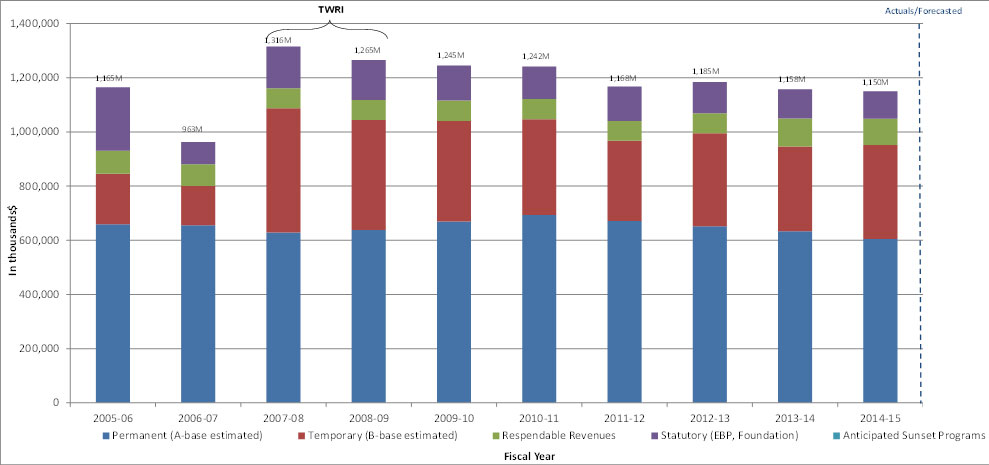
Long description
This bar graph shows Environment Canada's total parliamentary approved and forecasted authorities, which includes permanent, temporary, respendable revenues, statutory and anticipated sunset programs authorities from 2005-06 to 2014-15.
A separation on the graph shows that actual authorities are from 2005-06 to 2014-15
| 2005-06 | 2006-07 | 2007-08 | 2008-09 | 2009-10 | 2010-11 | 2011-12 | 2012-13 | 2013-14 | 2014-15 | |
|---|---|---|---|---|---|---|---|---|---|---|
| Permanent (A-base estimated) | $659 million | $656 million | $629 million | $638 million | $669 million | $694 million | $672 million | $652 million | $633 million | $605 million |
| Temporary (B-base estimated) | $186 million | $144 million | $459 million | $406 million | $371 million | $353 million | $296 million | $343 million | $313 million | $347 million |
| Respendable Revenues | $85 million | $81 million | $74 million | $74 million | $76 million | $75 million | $74 million | $74 million | $103 million | $97 million |
| Statutory (EBP, Foundation) | $234 million | $82 million | $154 million | $147 million | $129 million | $120 million | $127 million | $116 million | $108 million | $102 million |
| Anticipated Sunset Programs | $0 | $0 | $0 | $0 | $0 | $0 | $0 | $0 | $0 | $0 |
| Total Annual Authority | $1.165 billion | $963 million | $1.316 billion | $1.265 billion | $1.245 billion | $1.242 billion | $1.168 billion | $1.185 billion | $1.158 billion | $1.150 billion |
* 2015-2016 authorities include the Main Estimates, Supplementary Estimates (A), anticipated Supplementary Estimates (B) and the operating and capital carry forward.
* Under the Toronto Waterfront Revitalization Initiative (TWRI), $313.6M over two years was added to Environment Canada’s reference levels to support urban waterfront revitalization efforts in Toronto.
The graph above provides an estimate of future reference levels that includes the renewal of key initiatives. Typically, Environment Canada’s planned spending beyond 2015–2016 only reflects funding already approved by Treasury Board. Going forward, the Government can decide to extend, reduce or enhance funding for sunsetting initiatives and implement new initiatives. The outcomes of such decisions will be reflected in future budget exercises.
Financial Resources (dollars)
Compared with the 2014–2015 Main Estimates, Environment Canada's 2015–2016 Main Estimates of $1,049.7 million show a net planned spending increase of $28.9 million attributable to an increase of $8.6 million in Operating, $10.5 million in Capital, $7.1 million in Grants and Contributions and $2.7 million in the Employee Benefit Plan.

Long description
The first pie chart provides a breakdown of Environment Canada’s financial resources by allotment for the 2014-15 Main Estimates. The title indicates a total amount of $1.021 billion. The figure shows the amount of funding for each allotment:
- Salaries and Wages: $471 million, equivalent to 46%
- Operating: $216 million, equivalent to 21%
- Capital: $53 million, equivalent to 5%
- Grants and Contributions: $107 million, equivalent to 11%
- Vote Net Revenue: $89 million, equivalent to 9%
- Employee Benefit and Other Statutory Authority: $85 million, equivalent to 8%
The second pie chart provides a breakdown of Environment Canada’s financial resources by allotment for the 2015-16 Main Estimates. The title indicates a total amount of $1.050 billion. The figure shows the amount of funding for each allotment:
- Salaries and Wages: $478 million, equivalent to 46%
- Operating: $218 million, equivalent to 21%
- Capital: $63 million, equivalent to 6%
- Grants and Contributions: $114 million, equivalent to 11%
- Vote Net Revenue: $89 million, equivalent to 8%
- Employee Benefit and Other Statutory Authority: $88 million, equivalent to 8%

Long description
The first pie chart provides a breakdown of Environment Canada’s financial resources by strategic outcome for the 2014-15 Main Estimates. The title indicates a total amount of $1.021 billion. The figure shows the amount of funding and proportion for each strategic outcome:
- Sustainable Environment: $327 million or 32%
- Safe Environment: $235 million or 23%
- Clean Environment: $276 million or 27%
- Internal Services: $184 million or 18%
The second pie chart provides a breakdown of Environment Canada’s financial resources by strategic outcome for the 2015-16 Main Estimates. The title indicates a total amount of $1.050 billion. The figure shows the amount of funding and proportion for each strategic outcome:
- Sustainable Environment: $362 million or 35%
- Safe Environment: $250 million or 24%
- Clean Environment: $253 million or 24%
- Internal Services: $184 million or 18%
* Totals may not add up due to rounding
Environment Canada’s submission for Supplementary Estimates (A) includes items totaling a net increase of $21.8 million in funding bringing the total departmental budget to $1,071.5 million. These new appropriations consist of:
- $12.6 million for the conservation, protection and recovery of species at risk and their habitats; and
- $9.2 million for Federal Infrastructure initiative.
Environment Canada has received $52.6 million in carry forward from 2014–2015 [Information was severed in accordance with the Access to Information Act].
Budget 2015
Budget 2015 announced funding for Environment Canada that may be sought through the 2015–2016 Estimates process. These include:
- Funding for the Implementation of the Species at Risk Act for the continued protection of Canada’s diverse species and secure the necessary actions for their recovery. ($75 million over three years, including $50.4 million for Environment Canada – $12.6 million of which EC was requested via the 2015-2016 Supplementary Estimates (A)).
- Enhancing Meteorological and Navigational Warning Services to support Canada’s Arctic in order to continue to provide year-round meteorological and navigational warning services to support northern communities and safe marine navigation in the Arctic. ($34 million over five years, including $27 million for Environment Canada).
- The Major Projects Management Office Initiative will continue to provide a single window into the federal regulatory process and improve accountability to support the effective approval of major resource projects. ($135 million over five years, including $12.5 million for Environment Canada).
- The continuation of the Federal Contaminated Sites Action Plan
- The Chemicals Management Plan, for which the Government will complete the assessment of the remaining 1,700 legacy toxic substances and continue to protect Canadian families and the environment from the risks of harmful chemicals. ($491.8 million over five years, including $147.4 million for Environment Canada).
- Funding for Safe and Secure Shipping (previously World Class Tanker Safety) to enhance the safety of marine transportation in the Arctic and further strengthen environmental protection and marine incident prevention, preparedness and response South of 60. ($30.8 million, including $3.1 million over three years for Environment Canada).
Annex A - Funding Mechanisms
Interim Supply (3/12ths of the Main Estimates) - March
Interim Supply refers to the funds required by the Government to conduct its activities from April 1, the beginning of the fiscal year, to the final Supply day in the period ending June 23, when the House votes on the Main Estimates for the year.
Main Estimates / Full Supply - June
Full funding of the Main Estimates for the conduct of the government business and released by Parliament following the Governor General's confirmation.
Supplementary Estimates: A - June, B- December, C - March
The Supplementary Estimates seek authority for revised spending levels that Parliament will be asked to approve in an Appropriation Act. In addition, Supplementary Estimates provide Parliament with changes in the estimated expenditures to be made under the statutes previously passed by Parliament.
Budget Carry Forward
The Department can carry forward a portion of the unspent fund from the previous fiscal year (5% in Operating vote and 20% in Capital vote).
Special Governor General Warrants
The Financial Administrative Act allows the Governor in Council to ask the Governor General to issue a Special Warrant permitting the Government to make charges on the Consolidated Revenue Fund not otherwise authorized by Parliament, provided that the following conditions are met;
- Parliament is dissolved;
- A Minister has reported that an expenditure is urgently required for the public good; and
- The President of the Treasury Board has reported that there are no appropriations for the payment.
Special Warrants may be used only from the date of dissolution of Parliament until 60 days following the date fixed for the return of the writs after a general election.
Executive Team
- Deputy Minister
- Michael Martin
- Associate Deputy Minister
- Siddika Mithani
- Audit and Evaluation Branch
- Director General and Chief Audit Executive, Robert D’Aoust
- Legal Counsel
- Senior General Counsel, Jane Allain
- Communications Branch
- Director General, Max Guénette
- Meteorological Services of Canada
- Assistant Deputy Minister, and President of World Meteorological Organization, David Grimes
- Corporate Secretariat
- Director General, Judy Meltzer
- Science and Technology Branch
- Assistant Deputy Minister, Karen Dodds
- Corporate Services Branch
- Assistant Deputy Minister and Chief Information Officer, George Enei
- Strategic Policy Branch
- Assistant Deputy Minister, Dan McDougall
- Enforcement Branch
- Chief Enforcement Officer, Gord Owen
- Regional Director General’s office - Atlantic and Quebec Regions
- Regional Director General, Philippe Morel
- Finance Branch
- Assistant Deputy Minister and Chief Financial Officer, Carol Najm
- Regional Director General’s Office – Ontario
- Regional Director General, Michael Goffin
- Human Resources Branch
- Chief Human Resources Management Officer, Sylvain Paradis
- Regional Director General’s Office – West and North
- Regional Director General, Caroline Caza
- International Affairs Branch
- Assistant Deputy Minister, and Canada’s Chief Negotiator for Climate Change, Louise Métivier
Michael Martin, Deputy Minister
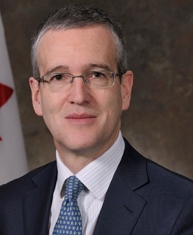
Michael Martin was appointed Deputy Minister of the Environment on June 20, 2014.
Mr. Martin began his public service career at the Department of Foreign Affairs and International Trade in 1984. He served overseas in Islamabad, Tokyo and Beijing as well as in Ottawa.
He joined Environment Canada in 2006 as Assistant Deputy Minister of Strategic Policy and was subsequently named Canada’s Chief Negotiator and Ambassador for Climate Change, for the negotiations leading up the Copenhagen Climate Conference.
Mr. Martin was appointed as Deputy Secretary to the Cabinet (Operations) at the Privy Council Office in 2010. Most recently he served as Senior Associate Deputy Minister of National Defence.
Mr. Martin was born in Edmonton and educated at the University of Victoria and at Yale University.
Siddika Mithani, Associate Deputy Minister

Dr. Siddika Mithani was appointed Associate Deputy Minister of the Environment on January 12, 2015.
Dr. Mithani began her federal public service career at the Department of Health in 1988.
Prior to her current position, Dr. Mithani was the Assistant Deputy Minister of the Science and Technology Branch at the Department of Agriculture and Agri-Food. Previously, she was the Assistant Deputy Minister of Ecosystems and Oceans Science at the Department of Fisheries and Oceans. She has also held the position of Associate Assistant Deputy Minister in the Health Products and Food Branch at Health Canada.
Dr. Mithani holds a Bachelor of Pharmacy and a Ph.D. in Psychopharmacology from the University of Aston, England.
Robert D’Aoust, Director General and Chief Audit Executive, Audit and Evaluation

Mr. D’Aoust career covers more than 30 years of professional and senior management experience, in both the private and public sectors. He has mostly served the federal government in areas such as comptrollership and finance, governance and accountability, audit and evaluation, management consulting, performance and productivity, grant and contribution programs.
Mr. D’Aoust is presently Chief Audit and Evaluation Executive at Environment Canada; he joined the Department in 2008 as Director General of Financial Services. In the 1980s, he first worked for a public accounting firm, and subsequently for a national management consulting practice. In the 1990s, he pursued his ambitions through the successful creation of a local consulting firm. In 2002, he joined the Office of the Auditor General of Canada as Director with the Commissioner of the Environment and Sustainable Development, and in 2005 was appointed as the Chief Financial Officer for the Office.
Originally from the National Capital Region, Mr. D’Aoust graduated from the University of Ottawa with a Baccalaureate in Commerce with honours (1978) and a Master in Business Administration specialized in management sciences (1981). He also holds the professional designations of Chartered Accountant and Certified Fraud Examiner.
Jane Allain, Senior General Counsel

Ms. Jane Allain has been the Executive Director and Senior General Counsel for Environment Legal Services since September 2013.
Ms. Allain has a varied legal background, serving the courts, the legislature and the executive branches of government. She clerked at two different courts, the Federal Court and the Superior Court of Justice in Ontario, and then worked for five years at the Library of Parliament serving members of Parliament and senators.
In 1996, she joined the Department of Justice. Her main areas of practice have been Aboriginal law, Administrative law and Constitutional law. She also managed different legal teams starting in the Aboriginal Law Section of Justice Canada, as well as the Public Health Agency of Canada and the Department of Foreign Affairs, Trade and Development Legal Services Unit.
She has a B.A. (with distinction) from Mount Allison University and an LL.B. (common law) from l’Université de Moncton, and a Certificate in Public Sector Leadership from the University of Ottawa.
Max Guénette, Director General Communications Branch

Max Guénette joined Environment Canada in January 2013 as Executive Director of Strategic Communications, and was appointed Director General of the Communications Branch in May 2014.
As the departmental Head of Communications, Mr. Guénette is responsible for delivering strategic communications planning and advice for both internal and external audiences, for managing public affairs and issues management, and for ensuring departmental compliance with Government of Canada policy requirements, particularly with regard to print and Web publishing. As the Senior Departmental Official for Web Renewal and Lead for Canada.ca’s Environment and Natural Resources Theme, Mr. Guénette’s responsibilities also include coordinating not only Environment Canada’s Web and Intranet sites, but also the migration of Web content from some twenty departmental Web sites to the new Canada.ca. In addition, he was appointed as Environment Canada’s Departmental Champion for the 2014 edition of the Public Service Employee Survey.
Before joining Environment Canada, Mr. Guénette was Director of Corporate Communications at the Treasury Board Secretariat (TBS), where he was responsible for communications planning, advice and services for internal communications, publishing and creative services, exhibits and advertising. He was also the departmental Centre of Expertise for Web Standards and for Web 2.0 and social media. From 2005 to 2007, he was Chief of Strategic Communications for TBS.
Previously, Mr. Guénette held several senior positions at Communication Canada and the Privy Council Office (PCO), including Chief of Staff to Communication Canada's Deputy Head from 2003 to 2004, and Special Advisor to the Director General of Communications at PCO Intergovernmental Affairs. He holds a Bachelor in Political Science from the University of Ottawa, and is a graduate of the Canada School of Public Service's Living Leadership, the Executive Excellence program
David Grimes, Assistant Deputy Minister Meteorological Services Canada, and President of World Meteorological Organization
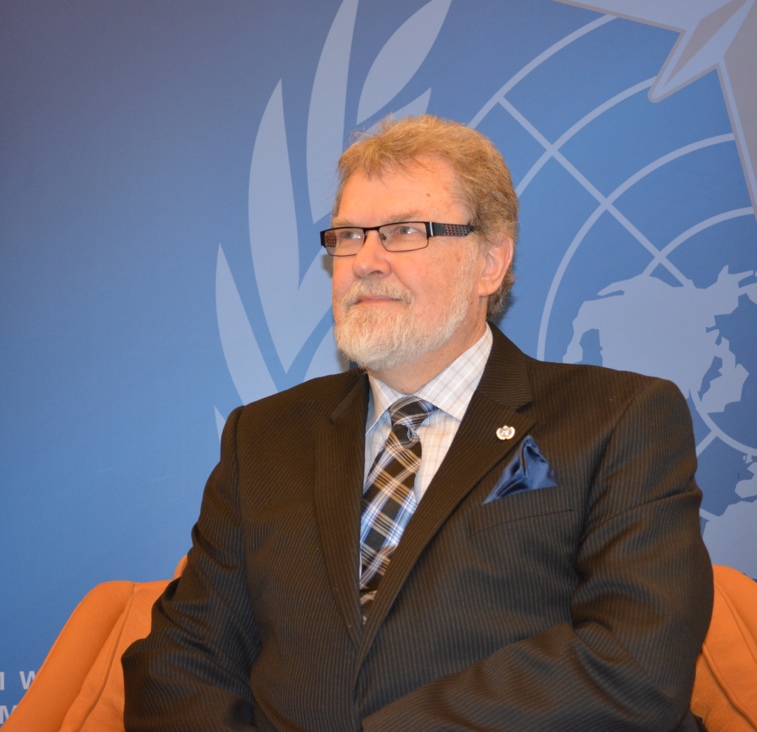
Mr. David Grimes has been Assistant Deputy Minister and head of Environment Canada's Meteorological Service of Canada since July 2006. He has been Canada's Permanent Representative with the World Meteorological Organization (WMO) since December 2006.
Mr. Grimes was re-elected President of the WMO by the Seventeenth World Meteorological Congress in 2015 for another four-year term. He has more than 25 years of experience working with WMO initiatives and programs.
He has over 40 years of scientific, operations, research, and management experience at Environment Canada. His experience also includes a significant number of positions and assignments over the years, ranging from weather forecast operations to science policy. He occupied the positions of Director General with the Meteorological Service of Canada for 15 years.
Mr. Grimes has extensive educational experience in the domains of science and management (MBA level). He holds a Bachelor of Science in physics, mathematics and meteorology. He has also been trained and carried out the responsibilities as an operational meteorologist.
Judy Meltzer, Director General Corporate Secretariat

Judy Meltzer was appointed as Director General of the Corporate Secretariat at Environment Canada in July 2015. Previously, she was the Senior Advisor to the Deputy Minister at Environment Canada. She first joined Environment Canada in 2009 as a Senior Policy Analyst in the Environmental Stewardship Branch. Prior to this, she worked in various policy and research institutions, including the Canadian Foundation for the Americas and the International Development Research Centre. Ms. Meltzer holds a PhD in Political Science and a Master of Arts in International Affairs.
Karen Dodds, Assistant Deputy Minister Science and Technology Branch
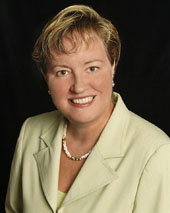
Dr. Karen Dodds became the Assistant Deputy Minister of the Science and Technology Branch at Environment Canada in January 2011. In this position, she oversees a large branch with activities, labs and scientists across Canada. From risk assessments of specific chemicals, to Canada’s national inventories of greenhouse gas emissions and of pollutant releases, to research and monitoring of water quality, air quality and climate change, and research on wildlife and habitat, the scientific interests and challenges are great.
Dr. Dodds is Canada’s Focal Point for the Intergovernmental Panel on Climate Change (IPCC).
Dr. Dodds came to Environment Canada from Health Canada, where she held a number of senior positions including Assistant Deputy Minister, Strategic Policy Branch, Executive Director of Health Canada’s Pest Management Regulatory Agency and Director General, Food Directorate.
Dr. Dodds holds a B.Sc. in biology and chemistry and an M.Sc. in microbiology from the University of Waterloo, and a Ph.D. in microbiology from the University of Guelph.
During her time as a researcher, Dr. Dodds published numerous scientific publications, wrote eight book chapters and edited two books.
George Enei, Assistant Deputy Minister and Chief Information Officer, Corporate Services Branch

Since joining the Public Service in 1988, Mr. Enei worked in various positions in Fisheries and Oceans Canada, Central and Arctic Region, before moving to Ottawa in 2001 to join the Privy Council Office (PCO), where he provided strategic policy advice on the government’s priorities and overall environmental agenda.
After joining Environment Canada in 2002, Mr. Enei led integration efforts on key government files involving conservation and environmental protection, as the Director of Conservation Priorities; Executive Director of Existing Substances; and then as Director General of Science and Risk Assessment Directorate. During this latter period, he also assumed the Presidency of the Bureau and Chair of the Organization for Economic Co-operation and Development (OECD) Chemicals Committee and Working Party on Chemicals, Pesticides, and Biotechnology. His four-year appointment to this position ended in November 2012.
Since 2011, as Assistant Deputy Minister of the Corporate Services Branch, and Chief Information Officer, he has been responsible for IM and IT related activities, property management services, as well as departmental security.
He holds a Bachelor of Applied Science (Civil Engineering) from the University of Toronto and a certificate in Municipal Administration from Mohawk College in Hamilton. He is a registered Professional Engineer in the province of Ontario.
Dan McDougall, Assistant Deputy Minister Strategic Policy Branch

Mr. Dan McDougall was appointed Assistant Deputy Minister, Strategic Policy Branch and Regional Directors General Offices at Environment Canada in January 2015.
As the head of the Strategic Policy Branch, which includes the Regional Directors General Offices, Mr. McDougall is responsible for strategic policy planning, economic analysis of policies and the implementation of the Federal Sustainable Development Strategy across the Government of Canada. He is also responsible for the Directorates which manage federal-provincial relations, and regional issues.
Previously, he was Canada’s Chief Negotiator and Ambassador for Climate Change and the Assistant Deputy Minister of the International Affairs Branch at Environment Canada.
Before joining Environment Canada in May 2011, Mr. McDougall was the Assistant Secretary to the Cabinet, Legislation and House Planning and Democratic Reform with the Privy Council Office, managing the overall legislative program for the government.
Mr. McDougall was previously the Director General, Oceans with Fisheries and Oceans Canada where he led the development of oceans management programs and marine conservation initiatives.
He has extensive experience with Aboriginal issues, having worked in a variety of policy areas with Indian and Northern Affairs Canada (now Aboriginal Affairs and Northern Development Canada), including the government’s response to the Royal Commission on Aboriginal Peoples.
Mr. McDougall started his career in government with Industry Canada where he worked on automotive and trade policy, including the AutoPact and the North American Free Trade Agreement.
Gord Owen, Chief Enforcement Officer Enforcement Branch

Mr. Gord Owen was appointed Chief Enforcement Officer of the Enforcement Branch in October, 2010.
Mr. Owen has over 25 years of public service experience, including 21 years with Environment Canada. Immediately prior to becoming the Chief Enforcement Officer, Mr. Owen was the Director General, Partnerships and Best Practices at the Canada School of Public Service. Previously, Mr. Owen worked with Environment Canada from 1991 to 2008, in various positions including, Director General of Energy and Transportation, Director General of the Clean Air Directorate, and Director General of the Environmental Technology Advancement Directorate.
Mr. Owen is a graduate of McGill University, holding a Master's of Science in Agricultural Engineering and a Bachelor's of Science in Agricultural Engineering and is a Professional Engineer.
Philippe Morel, Regional Director General
Atlantic and Quebec Regions

Mr. Philippe Morel’s mandate includes representing the interests of the Atlantic and Quebec regions within the Department, and sustaining strong ties with public- and private-sector partners and key community stakeholders. Through his duties, Mr. Morel also contributes to the delivery of national programs.
Since 1999, Mr. Morel has held various management positions in Environment Canada’s Quebec Region, including Director, Strategic Integration and Partnerships Division; Regional Director, Finance and Administration; and Director, Human Resources.
Before joining Environment Canada’s regional management team, Mr. Morel held various positions in the private sector and in a number of federal departments in the National Capital Region.
Mr. Morel holds a Bachelor’s degree in political science from the Université de Montréal and a Bachelor of Laws from the University of Ottawa.
Carol Najm, Assistant Deputy Minister and
Chief Financial Officer, Finance Branch

In May 2011, Ms. Carol Najm was appointed Assistant Deputy Minister and Chief Financial Officer, Finance Branch. Since November 2008, she served as Chief Audit Executive and Director General, Audit and Evaluation at Environment Canada.
Ms. Najm’s career spans both the private and public sectors. She began in the private sector where she worked in a public accounting firm in Ottawa and obtained her Chartered Accountant (CA) designation in 1989. She joined the Canadian Red Cross Society as Senior Auditor in 1992 and later went on to work with Canadian Blood Services where she was instrumental in the implementation of two major IT projects involving the renewal of the enterprise-wide financial and human resources systems.
Ms. Najm holds an Honours Degree in Commerce with a major in Finance, as well as a Bachelor of Administration, both from the University of Ottawa. She also holds certification designations as an Information Security Manager and an Information Systems Auditor.
Michael Goffin, Regional Director General, Ontario
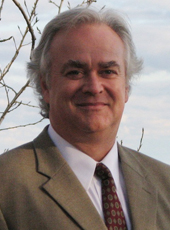
Mr. Michael Goffin is the Regional Director General for Environment Canada in Ontario.
Mr. Goffin was chief negotiator of the Canada-United States Great Lakes Water Quality Agreement and the Canada-Ontario Agreement on Great Lakes Water Quality and Ecosystem Health and is responsible for the delivery of the Great Lakes Basin Ecosystem Initiative.
Mr. Goffin joined Environment Canada in 1981. He has worked in a number of positions at both the regional and national levels, with responsibility for program delivery, planning, and policy development. His career in Environment Canada has included positions in the Canadian Wildlife Service, Meteorological Service of Canada, Environmental Protection Service, as well as Finance and Administration.
Mr. Goffin received his undergraduate training in environmental studies from the University of Toronto, and has a Master of Science degree in Geomorphology, also from the University of Toronto.
Sylvain Paradis, Chief Human Resources Management Officer, Human Resources Branch

In November 2015, Mr. Sylvain Paradis was appointed Chief Human Resources Management Officer, Human Resources Branch. Prior to his appointment, he was the Director General, Applied Research & Analysis, Strategic Policy Branch at Health Canada, and the Director General, Ecosystem Science Directorate before that.
Mr. Paradis has occupied positions in the Science Branch at Fisheries & Oceans Canada and was the Director of the Policy Research Division, in the Population & Public Health Branch at Health Canada. He has also spent several years managing the Environmental Contaminants Research programs of the First Nations & Inuit Health Branch at Health Canada.
Sylvain holds a Ph.D. in Sociology from the University of Montreal.
Caroline Caza, Regional Director General
West and North

Ms. Caroline Caza was appointed Regional Director General, West and North, in April 2014. Based in Vancouver, she is Environment Canada’s senior official in the four western provinces and three territories.
Prior to this appointment, Ms. Caza was the Executive Director for Environment Canada’s Environmental Assessment and Marine Programs. Since 2000, when she joined the federal government, she has also worked on global environmental issues, international development, biodiversity conservation, and clean-up of contaminated sites.
Ms. Caza obtained her M.Sc. from the University of Toronto, and her Ph.D. from the University of British Columbia in the field of ecology. She also worked on many wildlife conservation initiatives across Canada during her eight years with Wildlife Habitat Canada, a national non-governmental organization.
Louise Métivier, Assistant Deputy Minister International Affairs Branch and Canada’s Chief Negotiator for Climate Change

Ms. Louise Métivier is Environment Canada’s Assistant Deputy Minister of the International Affairs Branch and Canada’s Chief Negotiator for Climate Change. Her portfolio of responsibility includes international environmental issues relating to Canada's multilateral and bilateral relations with particular emphasis on North America, as well as international climate change negotiations.
Ms. Métivier started her career in the federal public service in 1989 with the National Energy Board and subsequently moved to Natural Resources Canada where she worked for more than 15 years on energy policy, federal-provincial relations on climate change and various energy efficiency programs.
Since joining Environment Canada in 2005, Ms. Métivier has played a key role in the development of policies and domestic regulatory strategies on climate change and air quality, including leading an extensive multi-stakeholders engagement process, which led to the endorsement by Federal-Provincial-Territorial Ministers of the Environment of the new Air Quality Management System for Canada. She also led the Department’s implementation of the pollution prevention provisions of the Fisheries Act, which includes national regulations for Mines, Pulp and Paper facilities and Municipal Wastewater Systems.
Ms. Métivier holds a bachelor’s degree in economics from Sherbrooke University, Quebec.